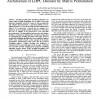Free Online Productivity Tools
i2Speak
i2Symbol
i2OCR
iTex2Img
iWeb2Print
iWeb2Shot
i2Type
iPdf2Split
iPdf2Merge
i2Bopomofo
i2Arabic
i2Style
i2Image
i2PDF
iLatex2Rtf
Sci2ools
105
click to vote
ISCAS
2005
IEEE
2005
IEEE
Scheduling algorithm for partially parallel architecture of LDPC decoder by matrix permutation
— The fully parallel LDPC decoding architecture can achieve high decoding throughput, but it suffers from large hardware complexity caused by a large set of processing units and complex interconnections. A practical solution of areaefficient decoders is to use the partially parallel architecture in which a PU is shared for a several rows or columns. It is important in the partially parallel architecture to determine the rows or columns to be processed in a PU and their processing order. The dependencies between rows and columns should be considered to minimize the overall processing time by overlapping the decoding operations. This paper proposes an efficient scheduling algorithm that can be applied to general LDPC codes, which is based on the concept of the matrix permutation. Experimental results show that the proposed scheduling achieves a higher decoding rate, leading to a reduction of 25% processing time on the average. A 1024-bit rate-1/2 LDPC decoder employing the proposed sch...
| Added | 25 Jun 2010 |
| Updated | 25 Jun 2010 |
| Type | Conference |
| Year | 2005 |
| Where | ISCAS |
| Authors | In-Cheol Park, Se-Hyeon Kang |
Comments (0)

